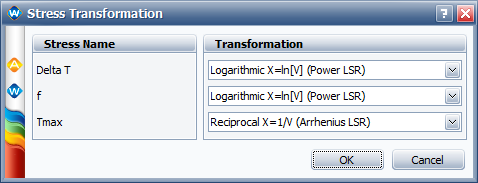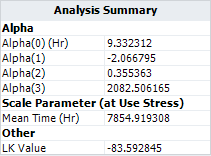Norris-Landzberg-Exponential Model: Difference between revisions
Jump to navigation
Jump to search
(Created page with '{{Reference Example|ALTA_Reference_Examples_Banner.png|ALTA_Reference_Examples}} Validate calculation of Norris-Landzberg relationship (can be done using the GLL model in ALTA w…') |
Kate Racaza (talk | contribs) No edit summary |
||
| (22 intermediate revisions by 2 users not shown) | |||
| Line 1: | Line 1: | ||
{{Reference Example| | {{Reference Example|{{Banner ALTA Reference Examples}}}} | ||
This example validates the results for the Norris-Landzberg life-stress relationship in ALTA standard folios. This is accomplished in ALTA by using the general log-linear model (GLL) with proper stress transformations. | |||
{{Reference_Example_Heading1}} | {{Reference_Example_Heading1}} | ||
The data set is from Example 7.2 on page 257 in book ''Life Cycle Reliability Engineering'' by Dr. Guangbin Yang, John Wiley & Sons, 2007. | |||
{{Reference_Example_Heading2}} | {{Reference_Example_Heading2}} | ||
The following table shows the thermal cycling profiles and test results for chip-scale package solder joints. In this example, the thermal cycling profile is represented by three independent stresses. These are: maximum temperature (<math>\,\!T_{Max}</math>), temperature difference (<math>\,\!\Delta T</math>) and cycling frequency (<math>\,\!f</math>). | |||
{| {{table|50%}} | |||
!Failure Time | |||
!T<sub>MAX</sub> (°C) | |||
!Delta T (°C) | |||
!<math>\,\!f</math> | |||
|- | |||
| 208||80||120||1 | |||
|- | |||
| 225||80||120||2 | |||
|- | |||
| 308||80||120||3 | |||
|- | |||
| 142||100||140||2 | |||
|- | |||
| 108||120||160||2 | |||
|- | |||
| 169||100||120||2 | |||
|- | |||
| 131||120||120||2 | |||
|- | |||
| 1300||80||50||2 | |||
|- | |||
| 650||100||70||2 | |||
|- | |||
| 258||120||90||2 | |||
|- | |||
| 6231||30||50||2 | |||
|- | |||
| 1450||30||70||2 | |||
|} | |||
{{Reference_Example_Heading3}} | {{Reference_Example_Heading3}} | ||
The book uses a multiple linear regression model to analyze the data set. The model parameters are estimated using the least squares method. The regression model is shown next: | |||
::<math>\begin{align}\\ | |||
=&ln\left ( L \right )=\alpha _{0}+\alpha _{1}ln\left ( \Delta T \right )+\alpha _{3}ln\left ( \frac{1}{T_{MAX}} \right )\\ | |||
\\ | |||
=&9.517-2.0635\times ln\left ( \Delta T \right )+0.3452\times ln\left ( f \right )+2006.4\times \left ( \frac{1}{T_{MAX}} \right ) | |||
\end{align}\,\!</math> | |||
{{Reference_Example_Heading4|ALTA}} | {{Reference_Example_Heading4|ALTA}} | ||
In ALTA, we use the general log-linear life-stress relationship with the exponential distribution (GLL-exponential model). The following picture shows the proper transformation for each stress. | |||
[[image:Norris-Landzberg Exp_Stress Transform.png|center]] | |||
The following picture shows the results in ATLA. Note that ALTA uses maximum likelihood estimation to estimate the parameters; therefore, the results are close to, but not exactly the same, as the results given in the book, where the least squares method is used. | |||
[[image:Norris-Landzberg Exp_Analysis Summary.png|center]] | |||
Latest revision as of 18:21, 28 September 2015
New format available! This reference is now available in a new format that offers faster page load, improved display for calculations and images and more targeted search.
As of January 2024, this Reliawiki page will not continue to be updated. Please update all links and bookmarks to the latest references at ALTA examples and ALTA reference examples.


